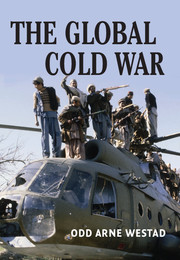Book contents
- Frontmatter
- Contents
- List of illustrations
- List of maps
- Acknowledgments
- List of abbreviations
- Introduction
- 1 The empire of liberty: American ideology and foreign interventions
- 2 The empire of justice: Soviet ideology and foreign interventions
- 3 The revolutionaries: anticolonial politics and transformations
- 4 Creating the Third World: the United States confronts revolution
- 5 The Cuban and Vietnamese challenges
- 6 The crisis of decolonization: Southern Africa
- 7 The prospects of socialism: Ethiopia and the Horn
- 8 The Islamist defiance: Iran and Afghanistan
- 9 The 1980s: the Reagan offensive
- 10 The Gorbachev withdrawal and the end of the Cold War
- Conclusion: Revolutions, interventions, and great power collapse
- Notes
- Index
10 - The Gorbachev withdrawal and the end of the Cold War
Published online by Cambridge University Press: 05 December 2012
- Frontmatter
- Contents
- List of illustrations
- List of maps
- Acknowledgments
- List of abbreviations
- Introduction
- 1 The empire of liberty: American ideology and foreign interventions
- 2 The empire of justice: Soviet ideology and foreign interventions
- 3 The revolutionaries: anticolonial politics and transformations
- 4 Creating the Third World: the United States confronts revolution
- 5 The Cuban and Vietnamese challenges
- 6 The crisis of decolonization: Southern Africa
- 7 The prospects of socialism: Ethiopia and the Horn
- 8 The Islamist defiance: Iran and Afghanistan
- 9 The 1980s: the Reagan offensive
- 10 The Gorbachev withdrawal and the end of the Cold War
- Conclusion: Revolutions, interventions, and great power collapse
- Notes
- Index
Summary
The American offensive against Soviet positions in the Third World began just as Moscow's own doubt about its policies in Asia, Africa, and Latin America was intensifying. Initially, however, Reagan's attempts at spreading counterrevolution did not push the Soviets toward withdrawing – on the contrary, evidence indicates that at least up to early 1987 American pressure made it more difficult for Moscow to find a way out of its Third World predicament. While the debate on the prospects for socialism outside Europe continued among Soviet leaders during the post-Brezhnev interregna – though in a more stifled form than prior to the Afghan invasion – ideology, alliances, perceptions of threat, and inner-party rivalry held them back from radical new conclusions. But as Afghanistan in the early 1980s became predominant among Moscow's Third World concerns, the lack of political results there made certain that the South increasingly became a problem in Soviet foreign relations, and not the bountiful opportunity that it had seemed a decade earlier.
Prior to his accession to power, Mikhail Gorbachev thought about the Third World in roughly the same terms and in the same trajectory as large parts of the Soviet official intelligentsia, from elation in the mid-1970s to doubt in the mid-1980s. As he took the reins, Gorbachev was still torn between his general optimism for the global prospects of socialism and the caution that his Marxist reading imbued him with.
- Type
- Chapter
- Information
- The Global Cold WarThird World Interventions and the Making of Our Times, pp. 364 - 395Publisher: Cambridge University PressPrint publication year: 2005

